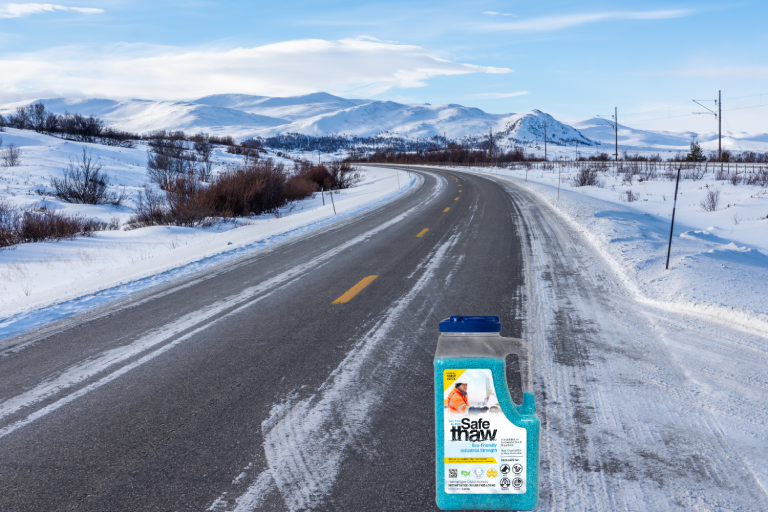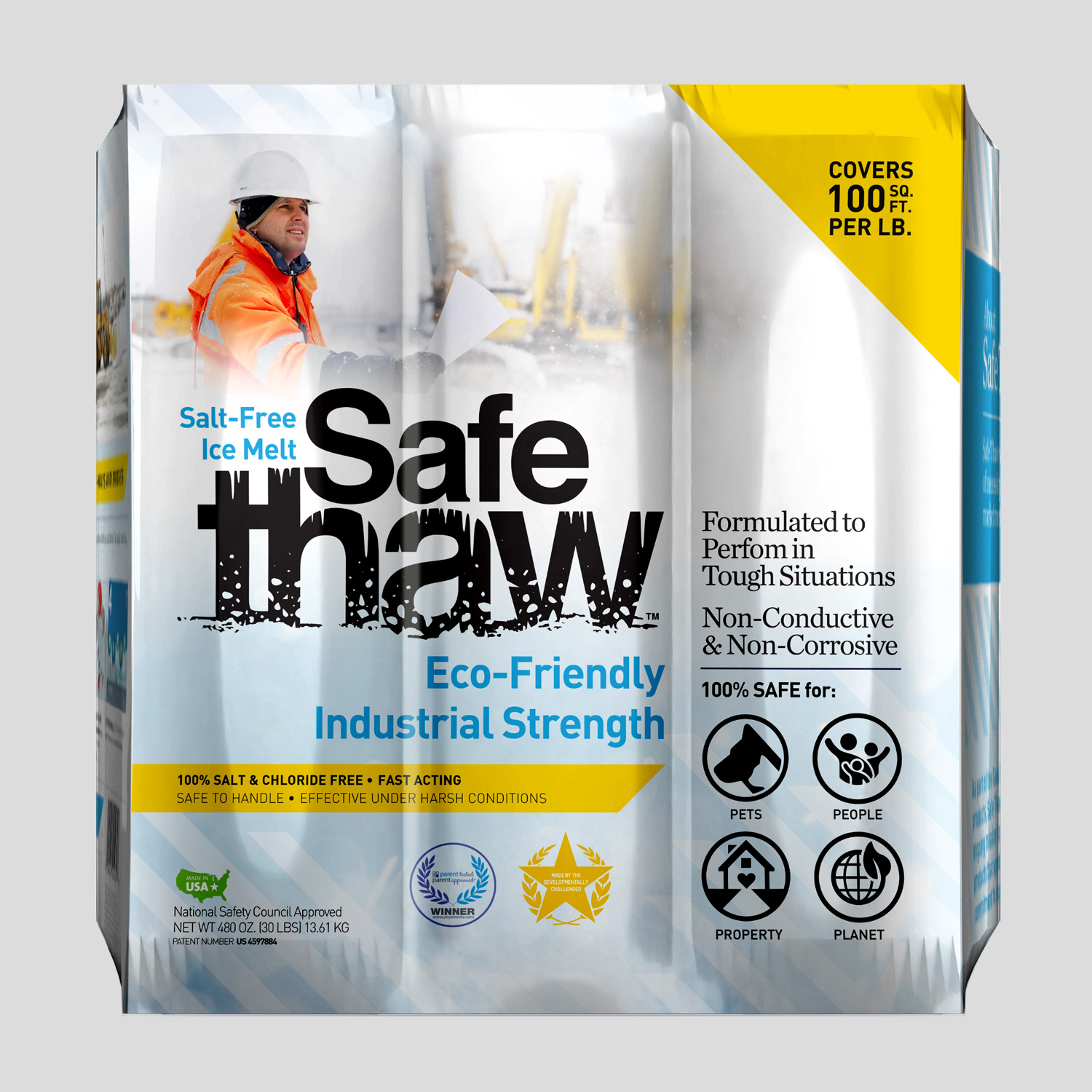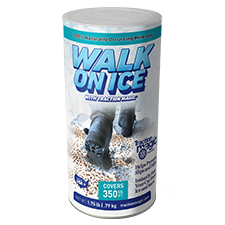Natural Stone Cleaning: Using Vinegar To Clean Rocks And Outdoor Surfaces”

Introduction
Whether for landscaping, construction, or interior design, natural stones are widely favored for their robustness and aesthetics. However, cleaning these rocks can be a challenging task. One natural solution that has garnered attention for “cleaning rocks with vinegar”. In this article, we’ll delve into this technique while discussing the potential impact of ice melting methods on outdoor stone surfaces, and how to choose a safe, effective alternative.

Safe Thaw
Safe Thaw was created as the ice management solution for tough winter environments. Ideal in commercial and industrial properties, shops, government agencies, bridges, and construction.
Understanding The Vinegar Cleaning Process
Vinegar, specifically white vinegar, is a mild acetic acid solution that works wonders in cleaning various surfaces, including natural rocks. The acid reacts with calcium carbonate, the primary mineral component in many types of rocks, dissolving any surface build-up and revealing a clean rock surface.
The Process Is Relatively Straightforward:
- Pre-rinse: Initially rinse off the rocks with water to remove loose dirt and debris.
- Vinegar Bath: Soak the rocks in a solution of half water and half white vinegar.
- Soak and Scrub: Let the rocks soak for 15-20 minutes before scrubbing them gently with a brush.
- Rinse and Dry: Thoroughly rinse the rocks with clean water and let them dry.
This procedure is effective for cleaning rocks, but it is essential to note that vinegar should not be used on certain types of rocks, like limestone or marble, as it can corrode them.
The Impact Of Ice Melting On Outdoor Stone Surfaces
In winter months, ice accumulation on outdoor stone surfaces can be a common problem. Many people resort to using rock salt to melt ice, not realizing the detrimental effect it can have on their stone surfaces.
Rock salt, while effective in lowering the freezing point of water and thereby melting ice, can be corrosive to stone surfaces. It can cause spalling – the chipping or flaking of stone surfaces due to the pressure buildup from the freeze-thaw cycle. Moreover, salt residues can seep into the porous structure of stones, causing long-term damage and discoloration.
Safe Thaw: A Superior Alternative
In contrast, Safe Thaw offers a safer, non-corrosive solution for melting ice on stone surfaces. Here’s why Safe Thaw stands out:
- Safe Chemistry: Safe Thaw, unlike rock salt, is a chemical-free, toxin-free ice melt that effectively breaks the surface tension to speed up the melting process.
- Surface Safe: Safe Thaw is 100% safe on all surfaces, including natural stones, providing protection from potential damage caused by other ice melting products.
- Environmentally Friendly: It’s not only safe for people, pets, and plants but also doesn’t contaminate groundwater, making it an environmentally responsible choice.
Practical Advice On How To Clean Stones And Rocks Outdoors
After covering vinegar-based cleaning, it’s worth addressing a broader question many people ask: how to clean stones and rocks that sit outdoors all year long. Not every stone reacts well to vinegar, and some, like granite or sandstone, may need a gentler approach. A simple routine of rinsing with water and scrubbing with a stiff brush often removes surface dirt without risking etching. For stubborn stains, a mild baking soda paste or an oxygen-based cleaner can lift debris without the corrosive effects of harsher agents.
Another overlooked factor is drainage. If water consistently pools around your stones, it leaves mineral deposits that even vinegar struggles to break down. Installing proper drainage or elevating stones slightly with gravel beds helps prevent buildup in the first place, reducing the need for deep cleaning later.
Ice Melt Considerations: Prestone Ice Melt vs. Safer Alternatives
When talking about outdoor stone care, winter maintenance naturally comes up. Many people still wonder whether products like Prestone ice melt are suitable for stone surfaces. While these chloride-based deicers are effective at cutting through ice quickly, their residues can penetrate stone pores and accelerate scaling or discoloration. Over repeated seasons, that buildup weakens the stone’s natural resistance and can make cleaning efforts much harder.
A safer alternative is a chloride-free solution designed specifically to protect both surfaces and the surrounding environment. Products like Safe Thaw ensure that ice is removed without leaving corrosive residues that you’ll be battling again in spring. The key takeaway? Choosing the right ice melt now makes stone cleaning easier later, as you’re not fighting salt stains or embedded chlorides.
Will Vinegar And Water Melt Ice? Clearing Up The Confusion
Since vinegar is already part of the conversation, another question often comes up: will vinegar and water melt ice in the same way it cleans stones? The short answer is: not really. While vinegar does have acetic acid that lowers freezing points slightly, it’s nowhere near strong enough to replace a proper ice melt solution. On a mild frosty morning, a vinegar-water spray might help loosen a thin glaze, but in freezing temperatures, it’s ineffective.
That’s why it’s important to separate cleaning from deicing. Vinegar works as a cleaning agent for stones but shouldn’t be relied upon as a winter safety tool. For snow and ice, you’ll want a proven ice melt that can withstand sub-zero conditions without damaging stone surfaces. This distinction helps avoid unnecessary disappointment—and prevents the misuse of vinegar where it isn’t practical.
Integrating Cleaning And Winter Protection Strategies
One of the most effective ways to maintain stone aesthetics is by pairing seasonal cleaning with protective winter practices. If you clean stones in late fall and then immediately face winter storms with salt-heavy deicers, much of that effort gets undone. Instead, adopting chloride-free products ensures your cleaned stones stay stain-free and don’t absorb harmful residues that require additional scrubbing later.
Additionally, sealing stone surfaces after cleaning can create a protective barrier. This doesn’t mean coating them in glossy finishes but using breathable, penetrating sealers that repel moisture and contaminants. When combined with safe deicers, this strategy prolongs the lifespan of natural stone and reduces the frequency of heavy cleanings.
100% salt & chloride-free, fast acting Ice Management Solution
Conclusion
Maintaining natural stone surfaces isn’t only about knowing how to clean stones and rocks with vinegar or other mild agents—it’s also about protecting them year-round. While vinegar is excellent for cleaning, it doesn’t double as an ice melt, so expecting it to perform in freezing conditions is unrealistic. On the flip side, relying on chloride-heavy options like Prestone ice melt only trades short-term convenience for long-term stone damage.
The smarter approach is a balanced one: use natural cleaners like vinegar or baking soda for routine maintenance, pair them with breathable sealers, and rely on chloride-free, surface-safe like Safe Thaw ice melts in winter. That way, your stones stay clean, strong, and visually appealing without the hidden costs of corrosion or staining.
Try Also Our Other Winter Safety Products:
Safe Paw
The Original and #1 Selling Pet and Child Safe Ice Melt for over 20 years. Guaranteed environmentally safe –It won’t harm animals or children, and it won’t damage your property. That’s Safe Paw. Safe Paw can change how winter affects our planet.

Walk On Ice
The handy disposable canister can be taken everywhere, with the same 100% naturally occurring minerals that provide instant traction on ice or snow. Use it on sidewalks, steps, or as an instant traction agent for your car.



